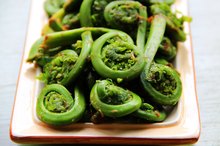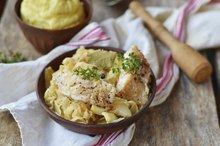Nutritional Value of Cornish Hens
Cornish hens -- consisting of tender, succulent light meat and conveniently sized for single servings -- resemble miniature roasting chickens, which is basically what they are. According to the U.S. Department of Agriculture, Cornish hens are simply young, immature chickens weighing between 1 to 2 lbs. Like most chickens raised for meat in the U.S., they have been crossbred to incorporate the traits of Cornish gamecocks with those of White Rock hens. High in protein and various nutrients, Cornish hens are a healthy dietary choice 1.
The Basics
A 3 1/2 oz. serving of roasted Cornish hen contains 23.30 g of protein and 3.87 g of fat. Cornish hens supply high-quality, complete protein that contains all of the essential amino acids. Protein is essential for building and maintaining blood, bones, internal organs and muscles -- including the heart -- and is vital for the production of hemoglobin. The majority of the fat in Cornish hens consists of heart-healthy monounsaturated and polyunsaturated essential fatty acids; unhealthy saturated fat in Cornish hens makes up less than 1 g out of every 100. Cornish hens' reasonable 134 calories per serving is more than justified by the high levels of protein, vitamins, minerals and essential amino acids they provide.
- serving of roasted Cornish hen contains 23.30 g of protein and 3.87 g of fat.
- Cornish hens' reasonable 134 calories per serving is more than justified by the high levels of protein, vitamins, minerals and essential amino acids they provide.
Vitamins and Minerals
Vitamins in Shrimp
Learn More
With 0.075 mg of thiamine -- or vitamin B1 -- and 0.227 mg of riboflavin -- or vitamin B2 -- in a 3 1/2 serving, Cornish hens offer a good supply of these water-soluble vitamins, needed for energy production. They are also an excellent source of niacin, or vitamin B3, providing an impressive 6.273 mg. Niacin helps produce energy on a cellular level and can help lower cholesterol. The same 3 1/2 oz. serving contains 0.358 mg of vitamin B6, which assists in the breakdown of protein into amino acids. In addition, Cornish hens are a powerhouse of essential minerals, with one serving providing a whopping 20 mg of the antioxidant trace mineral selenium -- needed for thyroid health -- and 1.53 mg of zinc, essential for wound healing and the coagulation of blood.
- With 0.075 mg of thiamine -- or vitamin B1 -- and 0.227 mg of riboflavin -- or vitamin B2 -- in a 3 1/2 serving, Cornish hens offer a good supply of these water-soluble vitamins, needed for energy production.
Amino Acids
Cornish hens are rich in essential amino acids 1. With 1.405 g in a 3 1/2 oz. serving, they are particularly high in arginine. By blocking arterial plaque and increasing blood flow through the coronary arteries, arginine helps promote cardiovascular health. The same serving of Cornish hen offers up 1.980 g of lysine, needed to help build protein, form collagen and produce carnitine, which converts fatty acids to energy. Cornish hens also provide healthy levels of tryptophan, leucine and glutamic acid.
- Cornish hens are rich in essential amino acids 1.
- The same serving of Cornish hen offers up 1.980 g of lysine, needed to help build protein, form collagen and produce carnitine, which converts fatty acids to energy.
Usage and Considerations
Pork Tenderloin Nutrition
Learn More
Raw Cornish hens can contain bacterial pathogens -- including salmonella, staphylococcus aureus and listeria -- and must be handled carefully to avoid cross-contamination. Make chicken your last purchase in the store, taking care to select chicken that is cold to the touch, and bag it securely so juices don't cross-contaminate other foods. Refrigerate at 40 degrees F and use or freeze within one or two days. Be careful that the raw chicken does not come into contact with other food or food preparation surfaces. Don't rinse, soak or wash chicken before cooking. Cook to a minimum temperature of 165 degrees Fahrenheit, measuring with a food thermometer and checking at the thickest part of the breast and under one wing.
- Raw Cornish hens can contain bacterial pathogens -- including salmonella, staphylococcus aureus and listeria -- and must be handled carefully to avoid cross-contamination.
- Make chicken your last purchase in the store, taking care to select chicken that is cold to the touch, and bag it securely so juices don't cross-contaminate other foods.
Related Articles
References
- USDA National Nutrient Database: Search Keywords -- Cornish Game Hen 05310
- American Cancer Society: Vitamin B Complex
- Drugs.com: L-Arginine Information
- University of Maryland Medical Center; "Lysine"; UMMC Staff; July 2010
- Outzen, M., Tjønneland, A., Larsen, E. H., Friis, S., Larsen, S. B., Christensen, J., ... & Olsen, A. (2016). Selenium status and risk of prostate cancer in a Danish population. British Journal of Nutrition, 115(9), 1669-1677.
Writer Bio
Carol Sarao is an entertainment and lifestyle writer whose articles have appeared in Atlantic City Weekly, The Women's Newspaper of Princeton, and New Millennium Writings. She has interviewed and reviewed many national recording acts, among them Everclear, Live, and Alice Cooper, and received her Master of Fine Arts degree in writing from Warren Wilson College.









